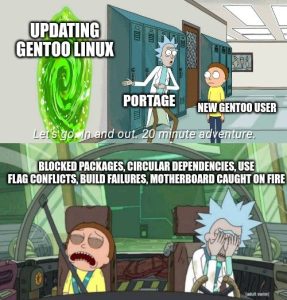Progress on Week 5
Week started off by receiving some feedback from the community in the forums. Here are some nice ideas that community have suggested to implement:
- Fallback to the latest version of the package if an error is encountered during an update;
- Add an option to control Portage niceness;
- Estimate update time;
- Notify users about obsolete USE flags;
- Think of a way to make updater work on
binpkgservers.
I will attempt to do 1-4 in the duration of Google Summer of Code.
There were also some suggestions on improving the workflow and many different opinions were voiced. The discussion is still ongoing, but it has already yielded some positive results.
I’ve made some progress on the Parser, it can now detect whether update has ended in an error or not. Log format and general output flow was modified to simplify parsing. Most noticeable change was the way how the updater.sh is launched. Before the whole script (~250 lines of Bash) were launched all at once, and now each function from the script is being launched separately. Additional flag (--report) was added to utilize the parser, it can now parse the last log from the log directory.
Furthermore, I spent sometime on organizing testing a bit better. I updated container versions and created a better naming convention for my containers to not get lost in them. 08-05-2023 Desktop image on openrc is being used to test glsa-check, and most recent openrc basic image is used to test updating functionality.
Challenges
Parser has turned out to be much harder than I anticipated. First of all, I had to make some changes to both Python and Bash code to create simpler log output, which reduced number of if/else statements in the parser.
Secondly, there were some motivation issues. It was a bit hard to focus on the parser, because a much better approach is to add machine readable output from Portage instead of parsing logs. I talked to my mentor about it and we decided to continue working on the parser, mainly because modifying Portage in any significant way take waay too much time.
Plans for Week 6
On week 6 the plan is to add error parsing and comprehension to the parser. This means I will have to find some different ways to cause Portage to break, and then try to make parser understand the errors that have occurred. Should be really fun!
After that is done, I can focus on using this information to create nice-looking update reports.



